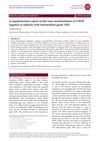 September 2022 in “Concilium”
September 2022 in “Concilium” Scalp cooling effectively prevents chemotherapy-induced hair loss but requires better pain management.
 62 citations,
February 2011 in “Expert review of dermatology”
62 citations,
February 2011 in “Expert review of dermatology” Scalp cooling can reduce chemotherapy-induced hair loss and should be available in all hospitals.
 9 citations,
January 2018 in “Acta Clinica Croatica”
9 citations,
January 2018 in “Acta Clinica Croatica” Bendamustine, often combined with other drugs, is effective and less toxic for certain blood cancers, but less effective for young, fit patients with CLL.
 March 2017 in “Fundamental & Clinical Pharmacology”
March 2017 in “Fundamental & Clinical Pharmacology” The model and estimator can predict drug exposure in kidney transplant patients well.
 522 citations,
January 2001 in “Cancer investigation”
522 citations,
January 2001 in “Cancer investigation” Doxil is an effective, modified chemotherapy drug with a unique toxicity profile and shows promise in treating certain cancers.
 19 citations,
October 1994 in “Tumori Journal”
19 citations,
October 1994 in “Tumori Journal” As of 1994, treatments for liver cancer had not significantly improved patient survival.
 1 citations,
January 2018 in “Springer eBooks”
1 citations,
January 2018 in “Springer eBooks” The document concludes that scalp cooling and treatments like minoxidil can help manage hair loss from cancer therapy.
 August 2018 in “SDÜ SAĞLIK BİLİMLERİ DERGİSİ”
August 2018 in “SDÜ SAĞLIK BİLİMLERİ DERGİSİ” No method fully prevents hair loss from chemotherapy, but some methods can reduce it and improve quality of life.
 4 citations,
March 2023 in “Current Oncology”
4 citations,
March 2023 in “Current Oncology” Scalp cooling is the only FDA-approved method to prevent hair loss from chemotherapy, but other treatments like minoxidil and PRP are being tested.
278 citations,
May 2013 in “Ca” Targeted anticancer therapies can cause severe side effects similar to traditional chemotherapy, but with different types.
 21 citations,
May 1989 in “Advanced Drug Delivery Reviews”
21 citations,
May 1989 in “Advanced Drug Delivery Reviews” Liposomes show promise in cancer treatment by delivering drugs with less toxicity and improved effectiveness.
 38 citations,
September 2017 in “Oncologist”
38 citations,
September 2017 in “Oncologist” Scalp cooling can help prevent chemotherapy-induced hair loss with a 50-90% success rate and is safe for patients.
 34 citations,
January 2018 in “International Journal of Dermatology”
34 citations,
January 2018 in “International Journal of Dermatology” Scalp cooling is the most effective FDA-approved method to prevent chemotherapy-induced hair loss, but more research is needed for other treatments.
 March 2008 in “Aging health”
March 2008 in “Aging health” Docetaxel is safe and works well for older people with cancer, with manageable side effects.
 68 citations,
May 2012 in “Annals of Oncology”
68 citations,
May 2012 in “Annals of Oncology” Some breast cancer chemotherapy can cause permanent hair loss.
 35 citations,
January 2004 in “European journal of oncology nursing”
35 citations,
January 2004 in “European journal of oncology nursing” Capecitabine is as effective as intravenous treatments with fewer side effects, but requires careful management of Hand-foot syndrome and patient education.
 19 citations,
November 2018 in “Nutrients”
19 citations,
November 2018 in “Nutrients” Annurca apple extract may protect mouse hair from damage by chemotherapy and could help treat hair loss without promoting cancer growth.
 19 citations,
June 2018 in “Breast Cancer Research and Treatment”
19 citations,
June 2018 in “Breast Cancer Research and Treatment” Scalp cooling effectively prevents severe hair loss in breast cancer patients treated with docetaxel and is safe.
37 citations,
October 2017 in “JEADV. Journal of the European Academy of Dermatology and Venereology/Journal of the European Academy of Dermatology and Venereology” Scalp cooling effectively reduces hair loss from chemotherapy.
February 2024 in “Frontiers in Cell and Developmental Biology” Eribulin-based chemotherapy is more effective and has fewer side effects for advanced triple-negative breast cancer.
 1461 citations,
March 2004 in “Annals of oncology”
1461 citations,
March 2004 in “Annals of oncology” Pegylated liposomal doxorubicin is as effective as conventional doxorubicin but causes fewer heart problems and side effects.
 168 citations,
December 1986 in “Cancer Chemotherapy and Pharmacology”
168 citations,
December 1986 in “Cancer Chemotherapy and Pharmacology” Epirubicin is as effective as doxorubicin for cancer treatment with less heart damage, but doesn't work on doxorubicin-resistant cancers.
 January 2024 in “International Journal of Health Science”
January 2024 in “International Journal of Health Science” Scalp cooling and low-power light therapy show promise in reducing chemotherapy-induced hair loss but need more research.
 December 2023 in “Trials”
December 2023 in “Trials” The trial is testing if a helmet that uses light can prevent hair loss during chemotherapy.
 39 citations,
January 1994 in “European Journal of Cancer”
39 citations,
January 1994 in “European Journal of Cancer” Scalp cooling is largely ineffective in preventing hair loss from breast cancer chemotherapy.
 January 2025 in “Journal of Education Health and Sport”
January 2025 in “Journal of Education Health and Sport” More effective methods are needed to prevent hair loss from chemotherapy.
 18 citations,
December 1996 in “Seminars in Cutaneous Medicine and Surgery”
18 citations,
December 1996 in “Seminars in Cutaneous Medicine and Surgery” Chemotherapy and cytokine therapy can cause various skin reactions, including hair loss and hypersensitivity.
 September 2012 in “International Current Pharmaceutical Journal”
September 2012 in “International Current Pharmaceutical Journal” CHOP chemotherapy causes many side effects but is generally well tolerated.

Treatments for acute leukaemia lead to high remission rates, but relapses occur, requiring ongoing advancements in care.
 3 citations,
July 2017 in “Elsevier eBooks”
3 citations,
July 2017 in “Elsevier eBooks” Skin reactions are a common reason for emergency visits due to drug allergies, with some severe cases needing intensive care.



























